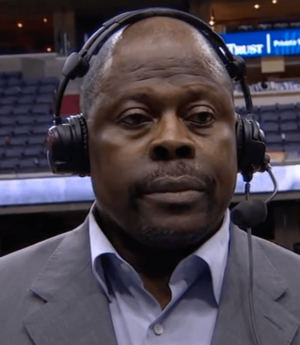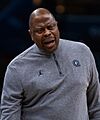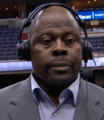Patrick Ewing facts for kids
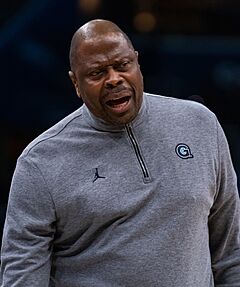
Ewing in 2021
|
|||||||||||||||||||||||
| New York Knicks | |||||||||||||||||||||||
|---|---|---|---|---|---|---|---|---|---|---|---|---|---|---|---|---|---|---|---|---|---|---|---|
| Basketball ambassador | |||||||||||||||||||||||
| Personal information | |||||||||||||||||||||||
| Born | August 5, 1962 Kingston, Jamaica |
||||||||||||||||||||||
| Nationality | Jamaican / American | ||||||||||||||||||||||
| High school | Cambridge Rindge and Latin (Cambridge, Massachusetts) |
||||||||||||||||||||||
| Listed height | 7 ft 0 in (2.13 m) | ||||||||||||||||||||||
| Listed weight | 255 lb (116 kg) | ||||||||||||||||||||||
| Career information | |||||||||||||||||||||||
| College | Georgetown (1981–1985) | ||||||||||||||||||||||
| NBA Draft | 1985 / Round: 1 / Pick: 1st overall | ||||||||||||||||||||||
| Selected by the New York Knicks | |||||||||||||||||||||||
| Pro career | 1985–2002 | ||||||||||||||||||||||
| Coaching career | 2002–present | ||||||||||||||||||||||
| League | NBA | ||||||||||||||||||||||
| Career history | |||||||||||||||||||||||
| As player: | |||||||||||||||||||||||
| 1985–2000 | New York Knicks | ||||||||||||||||||||||
| 2000–2001 | Seattle SuperSonics | ||||||||||||||||||||||
| 2001–2002 | Orlando Magic | ||||||||||||||||||||||
| As coach: | |||||||||||||||||||||||
| 2002–2003 | Washington Wizards (assistant) | ||||||||||||||||||||||
| 2003–2007 | Houston Rockets (assistant) | ||||||||||||||||||||||
| 2007–2012 | Orlando Magic (assistant) | ||||||||||||||||||||||
| 2013–2017 | Charlotte Bobcats / Hornets (assistant) | ||||||||||||||||||||||
| 2017–2023 | Georgetown | ||||||||||||||||||||||
| Career highlights and awards | |||||||||||||||||||||||
As player:
As coach:
|
|||||||||||||||||||||||
| Career NBA statistics | |||||||||||||||||||||||
| Points | 24,815 (21.0 ppg) | ||||||||||||||||||||||
| Rebounds | 11,617 (9.8 rpg) | ||||||||||||||||||||||
| Blocks | 2,894 (2.4 bpg) | ||||||||||||||||||||||
|
Medals
|
|||||||||||||||||||||||
Patrick Aloysius Ewing Sr. (born August 5, 1962) is a famous Jamaican-American basketball coach and former professional player. He is currently a basketball ambassador for the New York Knicks in the National Basketball Association (NBA). Ewing played most of his 17-year career as a starting center for the Knicks. He also played briefly for the Seattle SuperSonics and Orlando Magic. Many people consider Ewing one of the greatest centers in basketball history. He played a huge part in the New York Knicks' success in the 1990s.
Ewing was a highly sought-after player coming out of high school in Cambridge, Massachusetts. He played center for the Georgetown Hoyas for four years. During three of those years, his team reached the NCAA championship game. In 2008, ESPN named him the 16th-greatest college basketball player of all time.
In his 17-year NBA career, mostly with the New York Knicks, he was an 11-time All-Star. He was also named to seven All-NBA teams. The Knicks made it to the NBA Finals twice (1994 and 1999) while he was on the team. Ewing won Olympic gold medals with the United States men's Olympic basketball teams in 1984 and 1992. He was chosen as one of the 50 Greatest Players in NBA History in 1996 and one of the 75 Greatest Players in NBA History in 2021. He is in the Basketball Hall of Fame twice: once for his own career (2008) and again as a member of the 1992 Olympic team (2010). He was also inducted into the U.S. Olympic Hall of Fame with the "Dream Team" in 2009. The Knicks retired his jersey number 33 in 2003.
Contents
Early Life and High School Basketball
Patrick Ewing was born on August 5, 1962, in Kingston, Jamaica. This was just one day before Jamaica became an independent country. As a child, he was very good at cricket and soccer. In 1975, Ewing moved to the United States with his family. They settled near Boston in Cambridge, Massachusetts.
Ewing learned to play basketball at Cambridge Rindge and Latin School. His coach, Mike Jarvis, helped him a lot. Even though he had only played for a few years, Ewing became one of the best high school players in the country. He was known for his size and athletic ability. Because he was so tall and his team was so good, fans from opposing teams would sometimes tease him. Once, rival fans even rocked his team's bus when they arrived for an away game. Ewing led Cambridge Rindge and Latin to win three state championships in Massachusetts from 1979 to 1981.
College Career at Georgetown
When he was a senior in high school, Ewing decided to play for coach John Thompson at Georgetown University. He announced his decision in Boston, where many fans hoped he would play for local schools. When he chose Georgetown, many fans left the room. Ewing almost chose to play for the University of North Carolina. However, during his visit there, he saw a rally for the Ku Klux Klan, which made him decide not to go. He visited six colleges in total, including UCLA and Villanova.
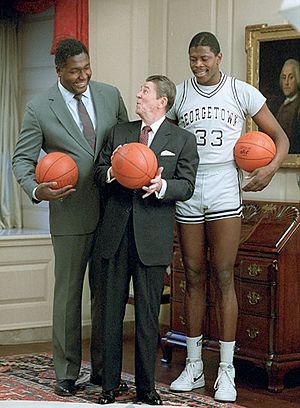
As a freshman in the 1981–82 season, Ewing was one of the first college players to be a star on the main team as a freshman. That year, he helped the Hoyas win their second Big East tournament title. They also earned a top spot in the NCAA Tournament. In the tournament, the Hoyas reached their first Final Four since 1943. They beat the University of Louisville to play against North Carolina in the NCAA Final.
In the championship game, Ewing was called for "goaltending" five times in the first half. This meant he blocked shots illegally. The Hoyas were leading late in the game, but future NBA star Michael Jordan made a shot that gave North Carolina the lead. Georgetown still had a chance to win, but a player made a bad pass, and North Carolina won.
For the 1982–83 season, Ewing and the Hoyas started as the second-ranked team. They played against the top-ranked Virginia and their star center Ralph Sampson. Virginia won, but Ewing made a powerful slam dunk right over Sampson. This play showed everyone that Ewing was a dominant "big man." The Hoyas finished the season with a 22–10 record and made it to the NCAA Tournament again. However, they lost in the second round. This was the only season Ewing's Georgetown team didn't reach at least the National Championship game.
In the 1983–84 season, Ewing led Georgetown to win the Big East regular-season championship and the Big East tournament championship. They also got another top seed in the NCAA Tournament. He was named the Big East Player of the Year. The Hoyas reached the Final Four again. They faced Kentucky, a team that had never lost a national semifinal game. Georgetown won, 53–40, and advanced to the National Championship game. In the final, the Hoyas played against the University of Houston and their future Hall of Fame center Hakeem Olajuwon. Ewing and Georgetown won 84–75, giving the school its first and only NCAA Championship. Ewing was named the tournament's Most Outstanding Player.
In Ewing's senior year, the 1984–85 season, Georgetown was ranked #1 in the country for most of the season. Ewing was again named the Big East Player of the Year, and the team won the Big East tournament title. They entered the NCAA tournament as the top seed. They reached another Final Four, their third in four years. In the semifinal game, Georgetown easily beat their rivals, St. John's, 77–59. This set up a game against another Big East rival, Villanova, for the championship. Georgetown was expected to win easily, but Villanova surprised them, shooting a record 78.6 percent from the field. Villanova won 66–64, stopping Ewing and Georgetown from winning back-to-back titles. At the end of the season, Ewing received the Naismith Player of the Year Award.
Ewing's four years in college are considered one of the most successful college careers ever. He helped Georgetown reach the NCAA Tournament final three times, win three Big East tournament titles, and earn four Big East Defensive Player of the Year awards. He was also named a first-team All-American three times. He also had a big impact on the sport. He was one of the first freshmen to lead a major college basketball team, which was very unusual back then. He also started a trend of wearing a short-sleeved T-shirt under his jersey, which many young athletes still do today.
NBA Career Highlights
New York Knicks (1985–2000)
—Pat O'Brien, quoting an unnamed NBA scouting director just before the 1985 NBA draft lottery.
Patrick Ewing was expected to be the very first player chosen in the 1985 NBA draft. Before 1985, the NBA draft was different. Teams with the worst records would have a coin toss to see who got the first pick. This sometimes made teams try to lose games on purpose. Starting in 1985, the NBA created a lottery system for teams that didn't make the playoffs. Each team had an equal chance to get the top pick.
In the first lottery, the New York Knicks won the top pick. This caused some talk that the draw was fixed, especially since Commissioner David Stern had grown up a Knicks fan. The Knicks chose Ewing, as everyone expected. He then signed a huge 10-year, $32 million contract.
Even though he had some injuries in his first year, Ewing was named NBA Rookie of the Year. He averaged 20 points, 9 rebounds, and 2 blocks per game. Soon after, he was seen as one of the best centers in the league. Ewing had a very successful career. He was an NBA All-Star 11 times. He was named to the All-NBA First Team once and the All-NBA Second Team six times. He was also on the NBA All-Defensive Second Team three times. He was part of the famous original Dream Team at the 1992 Olympic Games. He was also honored as one of the 50 Greatest Players in NBA History.
In the 1992 playoffs, the Knicks played against the defending champions, the Chicago Bulls, led by Michael Jordan. Ewing played incredibly well in Game 1, helping the Knicks win. The Knicks were almost eliminated in Game 6, but Ewing had one of his best games despite an ankle injury. He scored 27 points, and the Knicks won. However, the Bulls won Game 7 and eliminated the Knicks.
In 1993, the Knicks had a great regular season, with the best record in the Eastern Conference. They looked like they would reach the NBA Finals. They took a 2–0 lead against Michael Jordan's Chicago Bulls. The series was tough, with each team winning at home. But the Bulls surprised the Knicks by winning Game 5 in New York. The Bulls then won Game 6 and went on to win their third straight NBA title. This was another season where Ewing and the Knicks didn't win a championship.
With Michael Jordan not playing in the league, the 1993–94 season was wide open. Ewing said it would be the Knicks' year. He was key to the Knicks reaching the 1994 NBA Finals, their first Finals appearance since 1973. They lost to Hakeem Olajuwon's Houston Rockets in the final seconds of Games 6 and 7. To reach the Finals, the Knicks had a very tough playoff journey. They beat the Bulls and Scottie Pippen in seven games. They also beat Reggie Miller's Indiana Pacers in seven games. In the Finals, Ewing set a record for most blocked shots in a Finals series with 30. He also set an NBA Finals record for most blocked shots in a single game with 8.
The next year, in 1995, the Knicks lost to the Indiana Pacers in Game 7 of the Eastern Conference Semifinals. Ewing's potential game-tying shot missed in the final seconds. In the 1995–96 season, the Knicks were eliminated by the amazing 1995–96 Bulls, who won 72 games that year.
In the 1997 playoffs, the Knicks played the Miami Heat. Ewing was involved in a fight in Game 5 where players from both teams got involved. The Knicks were leading the series 3–1 but lost the next three games and were eliminated.
In the next season, Ewing had a serious injury on December 20, 1997. He fell badly and hurt his shooting hand, damaging his wrist. This injury usually happens in serious accidents. Ewing missed 56 games, but he recovered faster than expected. He returned for Game 2 of the Eastern Conference Semifinals against the Pacers. However, the Knicks still lost to the Pacers in five games.
In the lockout-shortened season of 1999, Ewing led the Knicks to another win over the Heat in the first round. He scored 22 points and grabbed 11 rebounds in the final Game 5. They then swept the Atlanta Hawks and beat the Pacers in the Conference Finals. However, the Knicks could not complete their amazing run, losing to the San Antonio Spurs in the Finals, 4–1.
In Ewing's last season with the Knicks in 1999–2000, the team reached the Conference Finals again. They swept the Toronto Raptors and beat the Heat for the third year in a row. But they lost to the Pacers in six games. In his final year with the Knicks, Ewing made a game-winning slam dunk over Alonzo Mourning in Game 7 of the Eastern Conference Semifinals. He played his 1,000th NBA game that season, finishing his Knicks career with a team-record 1,039 games.
After the Knicks
In 2000, Ewing asked to be traded from New York. The Knicks sent him to the Seattle SuperSonics in a big trade. After one season with the SuperSonics and another with the Orlando Magic, he announced his retirement on September 18, 2002. After retiring as a player, he became an assistant coach for the Washington Wizards.
In 1,183 games over 17 seasons, Ewing averaged 21.0 points, 9.8 rebounds, and 2.4 blocks per game. He shot better than 50% from the field. As of 2021, Ewing was 23rd on the NBA scoring list with 24,815 points.
On February 28, 2003, the Knicks retired his jersey number 33 in a special ceremony at Madison Square Garden. In October 2024, it was announced that Ewing would rejoin the Knicks as a basketball ambassador.
National Team Career
Ewing won Olympic gold medals with the United States men's basketball teams in 1984 and 1992. In 1984, Ewing averaged 11.0 points and was the top shot blocker with 18 blocks. The Naismith Memorial Basketball Hall of Fame called the 1992 "Dream Team" "the greatest collection of basketball talent on the planet."
Awards and Honors
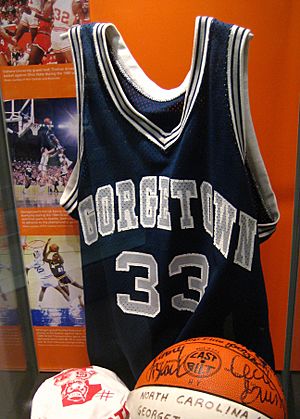
- Rookie of the Year (1986)
- All-NBA First Team (1990)
- All-NBA Second Team (1988, 1989, 1991, 1992, 1993, 1997)
- NBA All-Defensive Second Team (1988, 1989, 1992)
- 11-time All-Star
- One of 50 Greatest Players in NBA History (1996)
- 2-time Olympic gold medalist (1984, 1992)
- 3-time All-American (1983–1985)
- NCAA basketball tournament Most Outstanding Player (1984)
- Naismith College Player of the Year (1985)
- AP College Player of the Year (1985)
- NABC Player of the Year (1985)
- Sporting News College Player of the Year (1985)
- Adolph Rupp Trophy (1985)
- No. 33 jersey retired by the New York Knicks
- Basketball Hall of Fame inductee (2008 as an individual, 2010 as a member of the Dream Team)
- NBA 75th Anniversary Team (2021)
Ewing was a strong defensive player throughout his career. He often had tough competition for defensive awards from other great centers like Hakeem Olajuwon and David Robinson. In 1993, he led the NBA with 789 defensive rebounds. He was often in the top ten for field goal percentage, rebounds, points, and blocks. In 1999, Ewing became only the 10th player in NBA history to reach 22,000 points and 10,000 rebounds.
Coaching Career
From 2002 to 2003, Ewing was an assistant coach for the Washington Wizards. From 2003 to 2006, he was an assistant with the Houston Rockets. On July 3, 2007, Ewing became an assistant coach for the Orlando Magic.
The Magic reached the 2009 NBA Finals, where they lost. Ewing correctly predicted a win in Game 7 of the second round against the defending champion Boston Celtics. Later in the playoffs, Ewing saw Magic captain Dwight Howard set a new NBA Finals record for most blocked shots in a single Finals game, with nine. This broke Ewing's own record of eight blocks from the 1994 Finals. In 2010, Ewing got to coach his son, Patrick Ewing Jr., who played for the Magic in the summer league.
In 2013, Ewing became an assistant coach with the Charlotte Bobcats (now Charlotte Hornets). On November 8, 2013, he became the Bobcats' temporary head coach because the main coach had heart surgery. He lost his first game against his old team, the Knicks.
On April 3, 2017, Ewing was hired as the head coach of his former college team, the Georgetown Hoyas. In his first season, the Hoyas had a 15–15 record. In his second season, Georgetown was 19–14 and made it to the 2019 National Invitation Tournament, their first postseason tournament since 2015. In his third season, the Hoyas finished 15–17.
In Ewing's fourth season, he led the Hoyas to win the 2021 Big East Conference tournament championship. They were the eighth seed and defeated the top-seeded Villanova Wildcats. In the championship game, Georgetown beat the second-seeded Creighton Bluejays 73–48. This win qualified them for the 2021 NCAA Division I basketball tournament. This was Georgetown's first NCAA tournament appearance since 2015. However, in his fifth season, the Hoyas had a tough year, finishing 6–25 overall and not winning any Big East Conference games. In Ewing's sixth season, Georgetown finished with a 7–25 record. On March 9, 2023, Ewing was no longer the coach.
Other Activities
Ewing worked as an intern in Senator Bob Dole's office during several summers in college.
Ewing appeared as himself in the 1996 movie Space Jam. In the movie, his basketball talent was stolen by aliens. He also had a small role in the movie Senseless. Ewing made guest appearances as himself in TV shows like Spin City, Herman's Head, Mad About You, and Webster. He also appeared in a 2009 ad for Snickers candy bars. He had a silent role in the movie The Exorcist III.
He also helped write In the Paint, a painting how-to book for children. In 2014, Ewing and sports agent David Falk donated $3.3 million to a new athletics center at Georgetown University. The amount, $3.3 million, was chosen because 33 was Ewing's jersey number.
Sneaker Endorsements
Ewing's first sneaker deal was with Adidas in 1986. In 1991, a company called Next Sports made a deal to create shoes under Ewing's name in the United States. This new company was called Ewing Athletics and it operated until 1996. In 2012, David Goldberg and his company worked with Ewing to bring back the old Ewing Athletics shoe line. They brought the shoes back to stores, taking advantage of the popular trend of retro footwear.
Personal Life
Ewing was married to Rita Williams from 1990 to 1998. He has three children. His son, Patrick Ewing Jr., transferred to his father's college, Georgetown University. Patrick Jr. wore the same jersey number, #33. He was drafted by the Sacramento Kings in 2008 and then traded to the New York Knicks, his father's old team.
After his friend and fellow NBA center Alonzo Mourning was diagnosed with a kidney problem in 2000, Ewing promised to donate one of his kidneys if Mourning ever needed one. In 2003, Ewing was tested to see if he was a match for Mourning, but Mourning's cousin was a better match.
Images for kids
See also
 In Spanish: Patrick Ewing para niños
In Spanish: Patrick Ewing para niños
- Georgetown Hoyas men's basketball
- List of NBA career scoring leaders
- List of NBA franchise career scoring leaders
- List of NBA career rebounding leaders
- List of NBA career blocks leaders
- List of NBA career turnovers leaders
- List of NBA career personal fouls leaders
- List of NBA career free throw scoring leaders
- List of NBA career minutes played leaders
- List of NBA career playoff blocks leaders
- List of NBA single-season blocks per game leaders
- List of NCAA Division I men's basketball players with 2,000 points and 1,000 rebounds
 | Precious Adams |
 | Lauren Anderson |
 | Janet Collins |



